Dark Heart Read online
Page 7
Carmel stared at the screen of her laptop but couldn’t force herself, just yet, to go back to the business of reviewing Mike Ioannou’s notes. Damn Richard.
Was that it, she wondered; was it because she’d held out for so long? There had been more dates: movies, a day trip on the ferry to Magnetic Island, a visit to a local art gallery. Had he pursued her because he never gave up? Was she just another challenge to be conquered?
One night, after they’d been to see Schindler’s List at the cinema, he’d suggested that instead of finding a restaurant they get some takeaway and a bottle of wine and drive up Castle Hill.
‘Sure,’ she said to him, as they stood on the footpath outside the theatre. She felt her pulse quicken a little. Castle Hill was the sort of place teenage couples went to make out.
‘It’s so hot, I thought it might be a bit cooler up there,’ he said quickly, as if reading her mind.
They were just friends, she’d told herself at the time. He hadn’t once tried to make a move on her. But she loved his company and his friendship, and she saw the way that people, other women in particular, looked at him, and them, as they walked down the street. They stopped at a takeaway shop and bought a barbecued chicken, then at a liquor store for a bottle of chardonnay and a couple of plastic glasses. They got into Carmel’s second-hand sun-bleached Ford Capri convertible and took Castle Hill Road to the top of the three-hundred-metre-high granite hill that dominated the waterfront town. She had the top down and the moving air was a welcome relief from the heavy humidity.
‘I told you it would be nicer up here.’ Richard opened his door as soon as she pulled up, and got out. He walked to the railing of the lookout and stared out over the lights of Townsville and across the glassy sea to Magnetic Island.
She got out as he was coming back. She felt awkward, not knowing if they should sit in the car, or outside somewhere. She looked over at him and saw that his eyes were fixed on her. ‘Beautiful,’ she heard him say.
‘The view? Yes, I suppose it is. I walk up here for exercise sometimes, and . . .’
He walked around the front of the Capri to her. She stood on one side of the open car door and he on the other. He leaned across it and touched her cheek with the back of his hand.
His fingers were scalding. ‘Richard, I . . .’
He leaned closer and kissed her. Carmel threw her arms around him, the door between them uncomfortable and awkward as their lips locked, but she couldn’t wait. They laughed as he came around to her, and she leaned back against the bodywork as he pressed his body against hers. She loved the feel of his muscles under her hands for the first time, the smell of him this close, the taste of his mouth. She felt his hand on her breast. Her nipple responded and she reached for him.
‘Blanket?’ he murmured.
‘Uh-uh, sorry.’ There was nothing in the boot of her car except the flat spare tyre she’d been meaning to change.
‘No matter,’ he whispered. His hand moved lower, pressing her, touching her through the thin cotton of her sundress and her pants underneath. She felt how hard he was and it was more than the tropical heat that she could feel in her cheeks.
He broke from her, reached down and hit the passenger seat release so that the back folded and the seat slid forward. He eased himself into the back seat and held out his hand to her. ‘Come.’
She brushed damp hair from her eyes. For a moment she hesitated. This was not how it was supposed to be. He leaned forward and took her fingers in his, and she yielded to him. ‘It’s too cramped,’ she giggled nervously as she let him lead her in.
‘Not if you sit on top of me.’
She climbed in, holding the hem of her flowered dress up so she could straddle him, revelling in the flash of lust in his eyes as she did so. Carmel had never had sex anywhere other than a bed, and it had rarely been satisfactory. She leaned over him, her black hair curtaining his face, and kissed him deeply as she ground against him.
‘Carmel?’ he whispered in her ear as they kissed.
‘Mmm?’
A short pause, and then: ‘I think I love you.’
‘Me too. I want this, Richard.’
Gently, he lifted her off him and she was momentarily jolted with disappointment until she saw his grin as he reached into the pocket of his cargo shorts and produced the condom. He kept eye contact with her as he unzipped. She lifted her legs and wriggled out of her pants, then climbed on top of him again.
He undid the top three buttons that ran down the front of her dress and freed her breasts from her bra. She rocked her head back as he took each of her nipples, in turn, into his mouth. Carmel felt his hands on her again, the slight hilltop breeze cooling the skin of her bottom as he lifted her dress so he could grab her as she lowered herself onto him.
She had cried, burying her face in his shoulder, when the release came. She had worked so hard at school and university to please her parents, focused on being a good daughter and a good officer and not allowing herself to be led astray by the soldiers who had tried, and she had never had a man say he loved her. He held her tight, and the significance of the shift in her world had been illuminated by the glare of headlights coming up the hill. They had laughed as they scrambled back into the front seats and drove off, the warm breeze drying her tears of happiness. Back in her flat, off the base, they had drunk the wine and eaten, and made love again, and Carmel had climaxed, again and again, and understood, when she woke to find Richard beside her, what life was really about.
There was a knock at the door. Carmel grabbed a tissue from the box beside the hotel bed, wiped her eyes and opened the door. The room-service waiter wheeled in the breakfast she had ordered. She tipped him, blew her nose when he left, and went back to work.
When the senior prosecutor in Arusha had given her responsibility for Mike’s cases, he’d informed her that Ioannou had been investigating a new lead into the downing of Rwandan President Juvenal Habyarimana’s jet plane by on 6 April 1994 – an event that had sparked 1994’s infamous genocide. Habyarimana and the president of neighbouring Burundi, Cyprien Ntaryamira, had both been killed, and the Hutu extremists in the government had claimed that Tutsis had been responsible and had used the event to whip the Interahamwe – the Hutu extremist militia – into a killing frenzy. Subsequent enquiries, Carmel knew, had determined that while it was still not known exactly who had downed the aircraft, it was actually more likely to have been Hutu extremists, as a result of Habyarimana’s decision to accede to the Arusha peace accords and allow expatriate Tutsis to return to Rwanda. Carmel got the clear impression from her superior that Mike had been operating on his own on this one, as the investigation of the president’s death was out of the ICTR’s terms of reference.
She continued to read over the summary of Mike’s telephone conversation with Richard as she ate her breakfast. The file note said the conversation had taken place just six weeks earlier. Also in the file was a copy of a subpoena addressed to Richard at a post box at Skukuza Rest Camp, Kruger National Park, with a note that Richard had been emailed the subpoena just a few days earlier. She’d been to Kruger, South Africa’s flagship national park, twice.
She had to admit that the thought of bumping into him on this trip held some appeal – just so she could slap his face and remind him what a bastard he’d been to her back then.
Carmel’s anger abated as she started to read Mike’s notes. It was Richard’s version of that fateful day at the Kibeho refugee camp in south-western Rwanda. The words transported her back in time, and the cold, creeping memory of the horror started permeating through her body.
5
RWANDA, 1995
It was, Captain Richard Dunlop thought, a painting by Hieronymus Bosch in living, breathing and dying three-dimension.
Death was all around them, in sight, sound and smell, defiling all the senses at once. Richard looked into the eyes of the woman he’d just injected with morphine. Her breath rattled as she died. It had been pointless trying to save her
. She was too far gone.
Richard pulled his bloodied rubber gloves off and glanced up over the sandbag parapet to take in the scene from hell.
The sky was clouded with black smoke and grey ash from the burning of the damp thatch huts that had dotted the cleared hills of the Kibeho refugee camp. There’d been rain that morning and a drizzle might have made it through had the blanket of smoke and burning grass not been so thick. Over and above the burning smell there was the acrid stench of cordite drifting from gun barrels, and the pungent odours of blood and perforated bowels and intestines. A few of the Australian soldiers, hard-looking infantrymen who called themselves diggers, had been sick.
Out on the surrounding hills Hutu refugees lay dead and dying. As Richard watched, a ragged skirmish line of RPA soldiers in East German camouflage fatigues, gumboots and berets moved down the slopes on another sweep. Women, children and mostly old men rose from the grass and the piles of rubbish and corpses and took flight, like grouse startled by the noise of the beaters. Rifles were raised again and voices called target indications. Men laughed as they fired, trying to hit the runners before they reached the safety of the UN compound.
‘Can’t we do something, boss?’ A twenty-one-year-old Aussie medic looked at him with eyes rimmed the same red as his bloody hands. They’d all asked themselves and each other the same thing at one time or another through this bloody day. Richard didn’t know which was the greater madness, the greater evil – the men out there in the camp doing the killing, or the decree that the armed and ready UN peacekeepers must stay behind their barbed wire and sandbags in the Zambian compound and do nothing. They had been ordered, literally, to stand there and watch, and count the bodies, while unarmed civilians were shot dead in front of them.
And the RPA knew it. The commanders and their foot soldiers knew the peacekeepers were under orders not to intervene. So they taunted them – had done all morning. They made a game out of the killing.
The woman who had just died had almost made it to where Richard and the Australian and Zambian peacekeepers were based. She had already lost an arm below the elbow – hacked off with a panga in an earlier melee – and she had wrapped a discarded shirt around the stump as she staggered towards them. A Rwandan Patriotic Army, or RPA, soldier had put a bullet in her back, a lucky shot – for him – from a couple of hundred metres away. She had fallen and Richard was sure she was dead, but she pushed herself up to her knees and reached out to them with her one good hand, beseeching them.
An Australian infantryman had slung his F88 Steyr rifle over his back and vaulted over the sandbags. His mate had followed him and they zigzagged through the bodies. The RPA were still firing at scattered, running refugees who had taken flight, but the diggers had ignored the gunfire. Three RPA soldiers, including the man who had shot the woman, had also broken into a trot, and were running down the hill to try and reach the woman before the Australians could get to her and take her back to the safety of the Zambian compound. The UN outpost was an abandoned two-storey brick convent whose buildings were arrayed around an open courtyard fortified with wire and sandbags.
Richard had watched the race to see who would reach the woman first, the UN soldiers or the RPA.
‘Go Snowy, go Greeny!’ one of the other Aussies had called from the barricade.
The Australians had charged on, burdened with the weight of flak jackets, webbing gear, weapons and the blue Kevlar helmet that signified their membership of UNAMIR, the United Nations Assistance Mission For Rwanda, one of them almost falling as he slipped on garbage or guts or excrement – the ground was littered with all three. But the soldier had righted himself and he and his mate had reached the fallen woman, who had slumped onto her belly again. Her back was arched as she reached out to her rescuers. They’d shown heroism worthy of a gallantry medal to bring her back into the compound, and their comrades had given half-hearted cheers, and now the woman was dead. Their actions had been for nothing, but even so, more soldiers were sallying out in search of the living.
Richard took out his cigarettes. He’d be lucky to get in two or three drags before the medics brought over the next mutilated Rwandan. He lit it, took just one pull, then saw his female Australian Army counterpart bent over a man, sliding an IV into his arm. Richard ground out the smoke on the side of his boot – the bottom was covered in shit – and put the fag end in the pocket of his British Army-issue trousers, feeling guilty he’d lit up in the first place. Two soldiers laid another woman on a blood-soaked stretcher at his feet.
‘Panga wounds to the back and neck, boss,’ one of the diggers said. Richard pulled on fresh gloves and as he worked, checking the field dressings the soldiers had applied, he glanced out over the camp. Irate RPA soldiers yelled threats and insults at the two men who’d repeated Snowy and Greeny’s act of bravery. Despite the futility, they couldn’t give up.
It was a bizarre situation. The infantrymen in the peacekeeping force could not open fire on the RPA or use any force to stop them from going about the business of herding and killing their fellow countrymen. The Australians could only fire back in self-defence. If a civilian managed to reach the Zambian compound, then they were deemed to be under the protection of the UN peacekeepers. If a wounded person was reached first by the peacekeepers, they could be taken back to the compound. The RPA had refrained from shooting directly at the peacekeepers, though there was risk from wildly aimed shots into the crowd. The race to save a life had been played out many times already. For every man, woman or child the peacekeepers could dash out and save, many more were killed. In the peacekeepers’ favour, they didn’t have to venture out far from the compound to find people to treat – the Hutu refugees were being shot and hacked almost on the compound’s doorstep, and many others had been slashed by razor wire when the crush of panicked refugees pushed them against the defences of the UN laager.
The Rwandan government and the UN had been trying to close down the remaining Hutu refugee camps for months, since the RPA had taken control of the country. Among its estimated one hundred thousand inhabitants, the Kibeho camp held mostly innocent Hutus who had fled in fear of reprisals by the invading RPA, but it was also home to a rump of hardcore Hutu génocidaires who had left their escape to Zaire too late. They ruled over the moderates and innocents in the camp with the same combination of threats and violence that held sway in other camps across the border in Zaire.
When Richard had arrived a day earlier he and the Australians had set up a casualty clearing post, or CCP, to carry out health checks on the Kibeho residents as they made their way out of the camp, and while things had begun peacefully enough, some hardcore elements had tried to force their way into the Zambian compound to escape the RPA troops who were drawing the noose on the camp ever tighter, trying to force more and more people through the CCP at the same time. The CCP had relocated to the relative safety of the Zambian compound as the RPA began shooting to kill.
It was confusing. Some said that armed refugees had opened fire on the RPA and the new government troops had fired back, thus sparking what was fast turning into a spree of reprisal killings. Others said the RPA soldiers had started the killing. Gunfire was constant now, with Hutus being killed and wounded continually in front of the peacekeepers.
Richard had been too busy treating wounded people and was beyond caring how or why the madness had begun. He focused his attention on the young woman on the ground in front of him. She might have been pretty, but if she lived she would be forever scarred from the slash that had very nearly severed her carotid artery. The blow had been aimed downwards and had cleaved into the muscles of her shoulder and cracked her collarbone. She wailed as he lifted the field dressing. With the medic’s help he squirted Betadine solution into the wound, eliciting further yells. He’d seen people stagger into the compound speechless, with missing hands and horrific wounds, but the screaming always began as soon as the shock started to wear off. Richard gave the woman an injection of anaesthetic and opened a suture kit.
‘Hey, you peacekeeper dogs! Hey!’
‘Tie the dressing on her and get her to the ambulance,’ Richard said to the orderly. The Australians had a couple of six-wheel-drive Land Rover ambulances that had been ferrying the wounded to Kigali for two days now. It was a difficult business, deciding who would go to the capital. They had to be cases that were serious enough to warrant further surgery, but not so serious that the person would surely die before reaching an operating room.
Richard stood and looked over at the man who had called out. He was an RPA officer and he was dragging a woman towards the UN compound by her hair. The woman’s mouth was bloodied, presumably where he’d struck her, and she limped from a bullet wound in her right thigh that had soaked red the once bright yellow and green wrap she wore. She said nothing as he half-dragged, half-marched her in front of him, the pistol in his other hand pressed in her back.
‘Hey, you pathetic dogs. Look at this. Look at this woman. She is a Hutu – her people massacred nearly a million Tutsi. Who do you think you are, trying to protect these killers who have fled justice?’ The officer slurred his words and staggered a little. Richard wondered if he was drunk or stoned, or both.
Soldiers were standing behind the sandbags, their rifles at the high port with bayonets fixed, ready to take aim and fill the loud-mouthed RPA officer with lead if he snapped a shot in their general direction. The officer stared at them, then pushed the woman to her knees. ‘Well, who do you think you are?’ the officer screamed at them.
‘Let her go,’ one of the Australian medics yelled. ‘You bastard!’
The officer threw back his head and laughed. When he was finished he wiped his bloodshot eyes with the back of his hand and rammed the barrel of the pistol into the woman’s temple. The force pushed her head to one side.
‘No!’ Richard yelled.
The officer pulled the trigger. Blood spurted from the woman’s head as her body slumped to the ground. The man turned his back on them and walked away.

 The Cull
The Cull Blood Trail
Blood Trail Red Earth
Red Earth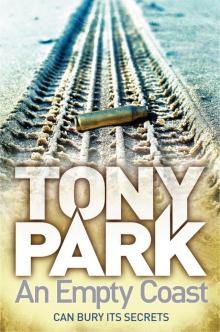 An Empty Coast
An Empty Coast Dark Heart
Dark Heart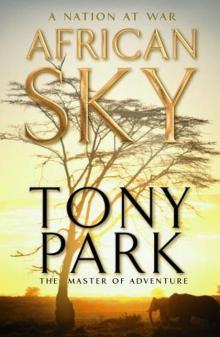 African Sky
African Sky The Delta
The Delta Captive
Captive Ivory
Ivory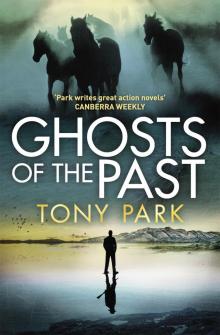 Ghosts of the Past
Ghosts of the Past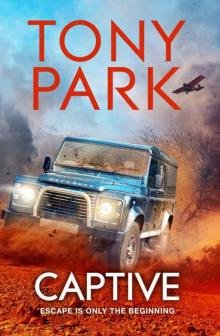 Captive_A High-octane And Gripping African Thriller
Captive_A High-octane And Gripping African Thriller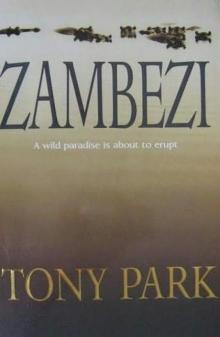 Zambezi
Zambezi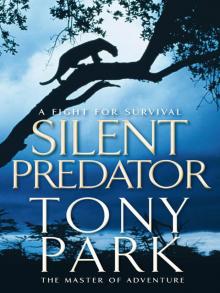 Silent Predator
Silent Predator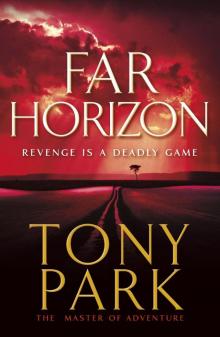 Far Horizon
Far Horizon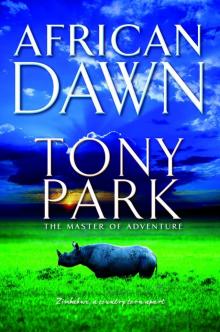 African Dawn
African Dawn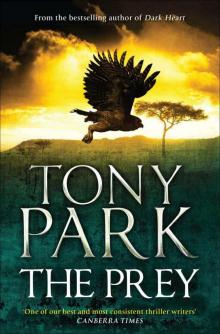 The Prey
The Prey Safari
Safari